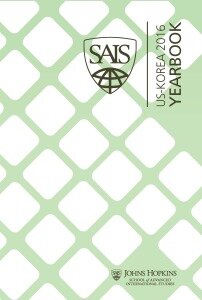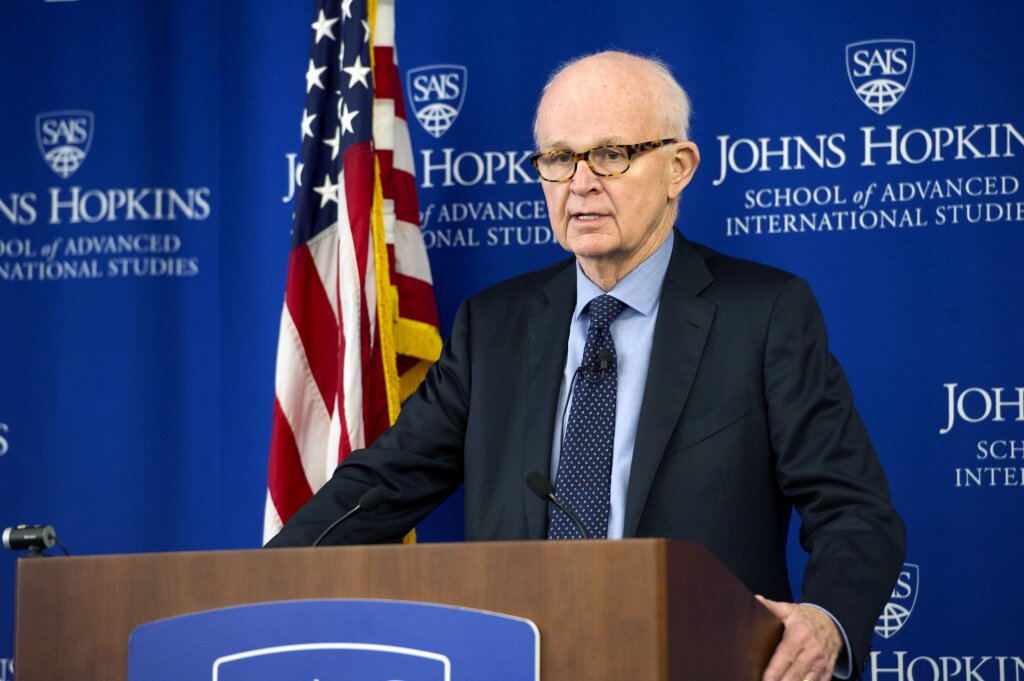Wednesday, Feb 22, 2017 – USKI-KNDU-INHA CIS Joint Symposium 2017
Stories Filed Under “South Korea”
2016 SAIS U.S.-Korea Yearbook
 The 2016 Edition of the SAIS U.S.-Korea Yearbook analyzes important developments in North and South Korea that characterized their relations in that year. Each paper was written by a SAIS student from the course “Korean Reunification and Asian Regionalization: Challenges and Prospects,” offered in the 2016 spring semester. Their insights were based on extensive reading and study as well as on numerous interviews conducted with government officials, scholars, NGO workers, academics and private sector experts both in Washington and Seoul.
The 2016 Edition of the SAIS U.S.-Korea Yearbook analyzes important developments in North and South Korea that characterized their relations in that year. Each paper was written by a SAIS student from the course “Korean Reunification and Asian Regionalization: Challenges and Prospects,” offered in the 2016 spring semester. Their insights were based on extensive reading and study as well as on numerous interviews conducted with government officials, scholars, NGO workers, academics and private sector experts both in Washington and Seoul.
Student authors featured: Christine Brown, Jaehan Park, Stephanie Faulkner, Yunping Chen, Han May Chan, Emily Potosky, David J. Jea, Maggie Yuan Yao, Crystal Styron, Ashley N. Patton
Read and download the full report here: 2016 SAIS US-Korea Yearbook
Learn more about the Korea Studies Program at SAIS.
One Korea Forum
Wednesday, Jul 13, 2016 – One Korea Forum
One Korea Forum
One Korea Forum
The Power of Freedom in Addressing the Divided Korean Family
Empowering the Voice of North Korean Defectors
Wednesday, July 13, 2016
10:00 AM – 12:00 PM
Johns Hopkins SAIS, Kenney Auditorium
1740 Massachusetts Ave, NW
Washington, DC 20036
To RSVP or learn more about this event, please visit: https://uskoreainstitute.org/events/OneKoreaForum
Click here to watch the webcast
Trends in South Korea’s Domestic Politics and Democracy
Thursday, Apr 14, 2016 – Trends in South Korea’s Domestic Politics and Democracy
Unfinished Apologies: Imperial Japan’s Sex Slaves of Wartime Asia
The U.S.-Korea Institute at SAIS and Asia Policy Point present
Unfinished Apologies:
Imperial Japan’s Sex Slaves of Wartime Asia
March 1, 2016
9:00 AM – 3:00 PM
Kenney Auditorium
1740 Massachusetts Ave. NW
Washington, DC 20036
The US-Korea Institute at SAIS and Asia Policy Point invite you to attend a discussion on the unexamined and unresolved history of Imperial Japan’s system of sex slavery in wartime Asia. The panels will provide an overview of how the system came to be and how it was managed, discuss new research on the non-Korean Comfort Women, and bring the legacy of the Comfort Women system into contemporary understandings of conflict resolution and violence against women in warfare settings.
Panel 1: Framing the Comfort Women History – Japanese Comfort Women and their Antecedents
- Caroline Norma, lecturer in the Master of Translating and Interpreting degree in RMIT’s School of Global, Urban and Social Studies, Melbourne, Australia
- Discussant: Katharine H.S. Moon, SK-Korea Foundation Chair in Korea Studies and senior fellow at the Brookings Center for East Asia Policy Studies
Panel 2: The Comfort Women of Japan’s Occupied Asia
- Griselda Molemans, Dutch researcher and investigative journalist, founder of the Task Force for Dutch Indies War Reparations (Dutch acronym: TFIR; Task Force Indisch Rechtsherstel)
- Hilde Janssen, Dutch Journalist and author Schaamte en Onschuld[Shame and Innocent] and Troostmeisjes/Comfort Women
- Peipei Qiu, Professor of Chinese and Japanese on the Louise Boyd Dale and Alfred Lichtenstein Chair, Vassar College
- Evelina Galang, Professor of English, University of Miami
- Caroline Norma, RMIT, Melbourne, Australia
- Moderator: Yukiko Hanawa, Department of East Asian Studies, New York University
Keynote: Women in warfare, how far have we come?
- Taina Bien-Aimé, Executive Director, Coalition Against Trafficking in Women
Book signing with authors:
- Caroline Norma, The Japanese Comfort Women and Sexual Slavery during the China and Pacific Wars
- Peipei Qiu, Chinese Comfort Women: Testimonies from Imperial Japan’s Sex Slaves
- M. Evelina Galang, Angel de la Luna and the 5th Glorious Mystery
- Hilde Janssen, Troostmeisjes/Comfort Women
- Margaret Stetz, Legacies of the Comfort Women of World War II
https://uskoreainstitute.org/events/unfinishedapologies/
The event will be webcast here.
Remembering Amb. Stephen Bosworth
Ambassador Stephen Warren Bosworth died of pancreatic cancer in his home in Boston on Monday, January 4, 2016.
Stephen Bosworth was a career American diplomat and was chairman of the U.S.-Korea Institute at Johns Hopkins School of Advanced International Studies (SAIS) and held an appointment as a Senior Fellow at the Belfer Center for Science and International Affairs at the Harvard Kennedy School of Government. He was also served as the Payne Lecturer at the Freeman Spogli Institute at Stanford University in 2014.
Ambassador Bosworth served as Dean of The Fletcher School of Law and Diplomacy at Tufts University from 2001-2013. His administration at Fletcher is credited with increasing the size of the Fletcher faculty and student body while securing the financial soundness of the school during a period of economic uncertainty. He oversaw the creation of new degree programs that have significantly expanded the scope of The Fletcher School’s teaching, research, and global outreach. During his tenure as Dean at the Fletcher School, Ambassador Bosworth also served President Obama and Secretary of State Hillary Clinton as United States Special Representative for North Korea Policy from 2009 to 2011.
“Stephen Bosworth was among the best diplomats of his generation. A consummate professional and a student of history, he managed American foreign policy skillfully at critical junctures and left an indelible imprint on America’s policy toward Asia,” said Vali Nasr, dean of Johns Hopkins SAIS, “He was a transformational dean at the Fletcher School at Tufts University where he oversaw development of new programs. Insightful, kind and considerate, he was a great influence on friends and colleagues and generations of students who studied international affairs.”


